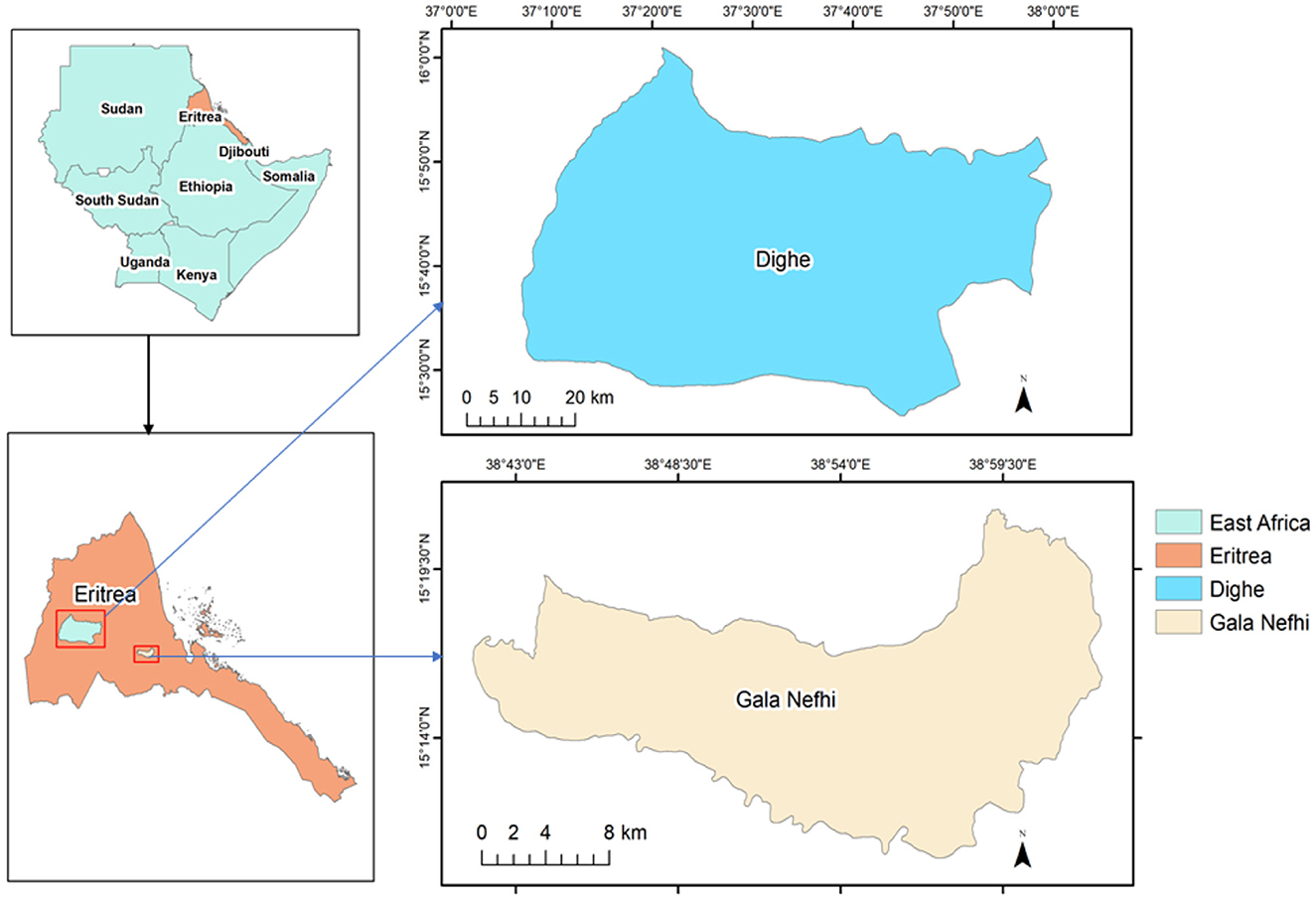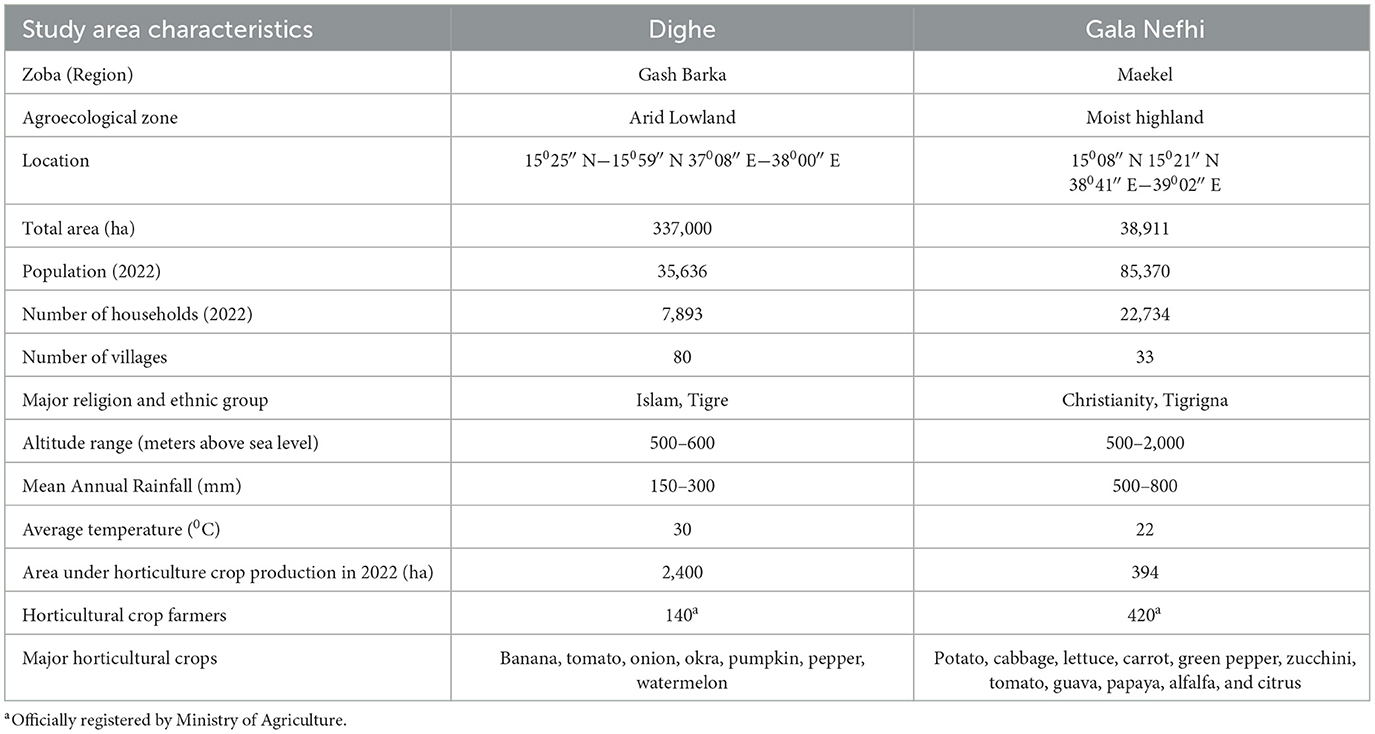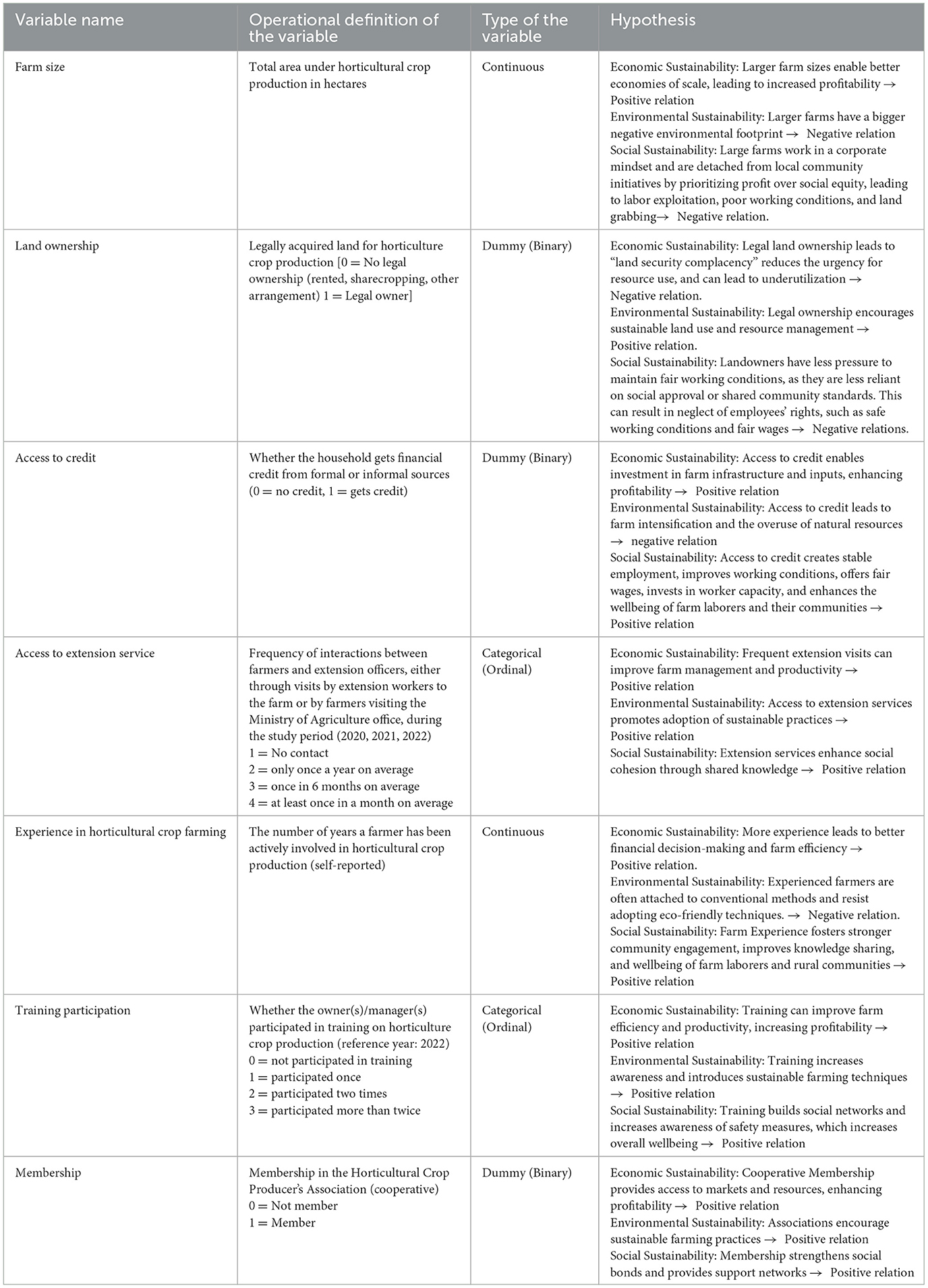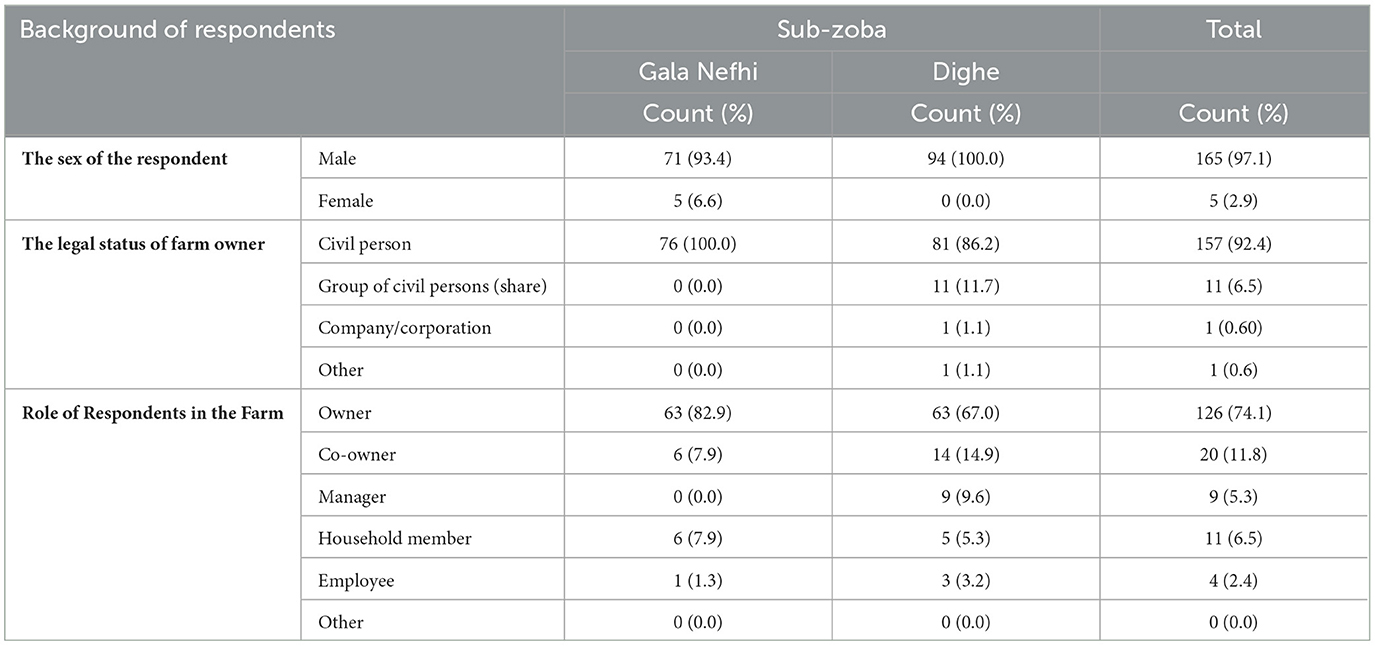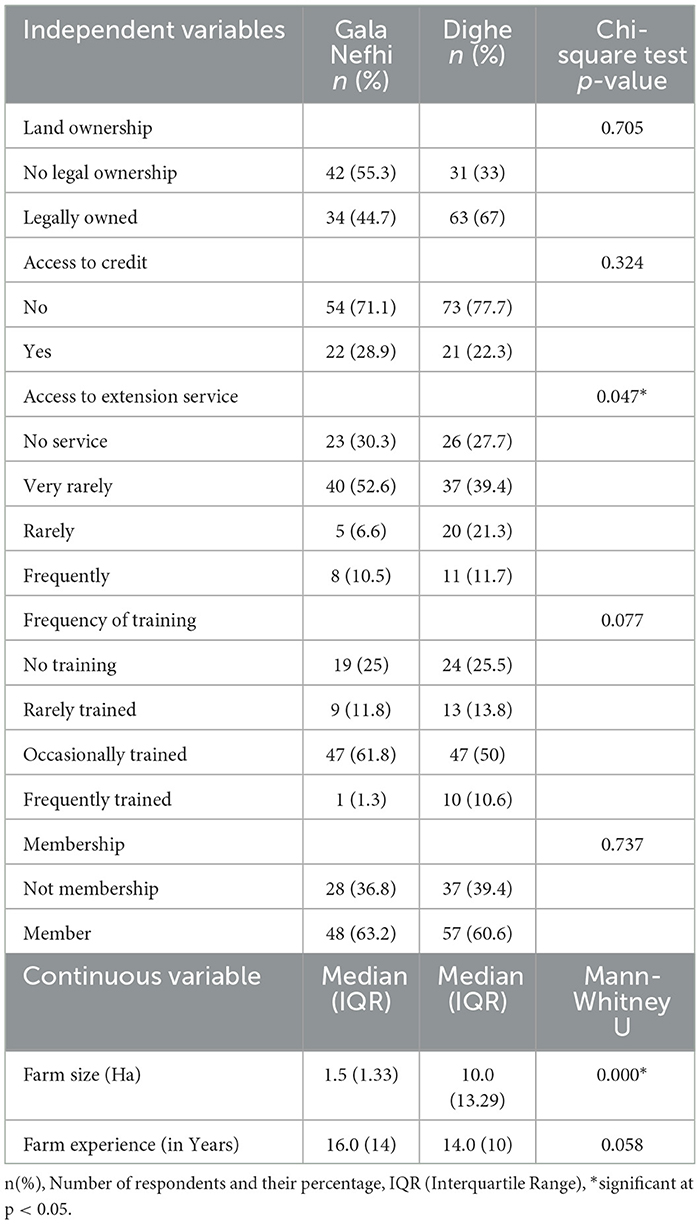- 1Center for Environmental Studies, Department of Geography, Geoinformatics and Meteorology, University of Pretoria, Hatfield, South Africa
- 2Department of Environment and Geography, University of York, York, United Kingdom
- 3Ministry of Agriculture, Asmara, Eritrea
Introduction: Measuring the sustainability of agricultural practices at the farm level is a prerequisite for devising effective policies and strategies. This study offers an in-depth farm-level sustainability assessment of Eritrea's horticultural sector. It aims to assess the sustainability of horticultural crop production using 12 customized indicators co-developed with local stakeholders, identify the principal factors influencing sustainability performance, and compare the sustainability performances across two regions of Eritrea with different agroecological and socioeconomic settings.
Methods: Primary data from 170 horticultural farmers were collected using a field survey focusing on activities conducted from 2020 to 2022. The assessment uses a traffic light approach to classify farms into three categories: unsustainable (red), acceptable (yellow), and sustainable (green). Multiple Linear Regression (MLR) is applied to explain the main factors contributing to the sustainability score of farms across the studied regions.
Results: The study shows disparities in sustainability performance between the two study regions as measured by the indicators. The MLR model shows that farming experience, extension services, and cooperative membership significantly influence most sustainability outcomes (p < 0.05).
Discussion: This study highlights the necessity for a context-specific approach to assess farm-level sustainability. By mapping the sustainability landscape of the horticultural sector and identifying key levers for improvement, the study paves the way for informed, impactful strategies to advance agricultural sustainability at the farm level.
1 Introduction
Following Brundtland's report (Brundtland, 1987), the issues of sustainability in all sectors, including agriculture, received extensive attention. The achievement of the 2030 Sustainable Development Agenda hinges on addressing challenges within the agricultural domain, which serves as a primary source of employment and economic growth in numerous low- and middle-income countries (FAO et al., 2023). The need to focus on agriculture is further compounded by the increasing global population, which demands a rise in food production, prompting policymakers to prioritize the intensification of agricultural activities. However, this will have adverse effects on the environment and society (Bell and Morse, 2001; Pretty et al., 1996). Therefore, the implementation of sustainability principles in agriculture becomes imperative as it can hugely contribute toward sustainable development.
Horticulture production is a vital component of the agricultural sector and is expanding rapidly, driven by growing demand for both local consumption and exports (FAO, 2024; Satisha, 2023). However, this growth has significant environmental impacts, including high resource demands for land, freshwater, and energy, which are causing pollution and soil degradation related to the use of chemical fertilizers and pesticides (Lillywhite, 2014; Wainwright et al., 2014). Economically, the sector faces challenges such as price volatility and market instability, especially due to the perishability of produce, which creates profitability pressures and heightens the risk for small-scale producers (Etefa et al., 2022). Socially, horticulture is labor-intensive, often creating low-wage jobs with inadequate safety standards, while issues such as gender equity, fair wages, and secure access to land remain concerns (Bertschinger, 2004; Dolan and Sutherland, 2002; Nischalke et al., 2018). In response to these challenges, international organizations such as the FAO promote sustainable practices and policies aligned with Sustainable Development Goal 2.4.1, which aims to establish resilient and sustainable food production systems (FAO, 2012, 2017). Through these efforts, they seek to mitigate environmental impacts, stabilize markets, and improve social equity within horticultural production systems.
Considering the multifaceted nature of horticulture production, it is crucial to view its sustainability from three dimensions, i.e., economic (profitability and long-term financial viability), environmental (compatibility with natural ecosystems and maintenance of natural systems), and social justice (fair and equitable distribution of wealth it generates) (Angevin et al., 2017; Gómez-Limón and Sanchez-Fernandez, 2010). However, most sustainability assessments to date focus mainly on environmental issues with less emphasis on the economic and social aspects (Janker and Mann, 2020). Integrated approaches that provide information regarding potential synergies, trade-offs, and contradictions between the various pillars of sustainability should be devised and applied to provide a more meaningful and holistic assessment.
Due to its normative nature, the precise determination and quantification of agricultural sustainability using a standard method is still challenging (Silvestri et al., 2024). However, if measured using appropriate tools and indicators, it can provide strategic information to develop evidence-based policies (Bell and Morse, 2008; Rigby et al., 2001). A systematic literature review of 38 sustainability assessments of agricultural practices by Lampridi and Sørensen (2019) shows that the most used methods are indicator-based tools, followed by the use of frameworks, indices, and multicriteria methods. This signifies that sustainability indicators are vital for evaluating progress, guiding corrective actions, and ensuring alignment with sustainability objectives.
The selection of indicators depends on the goals and objectives of the sustainability assessment, the availability of data and resources, and their relevance to the specific context to provide meaningful insights (Frater and Franks, 2013; Zhen and Routray, 2003). Moreover, it is highly recommended to engage all key stakeholders through a participatory approach (Haile et al., 2024; Luján Soto et al., 2020; Reed et al., 2008; Yegbemey et al., 2014). Researchers often combine quantitative and qualitative indicators to view agricultural practices comprehensively. When the threshold for a given sustainability indicator is specific and has a quantifiable limit, researchers tend to use impact (outcome)-based indicators and use the measurable parameter as an indicator to evaluate whether the farm is within the safe or acceptable range, for example, yield, soil organic matter, CO2 flux, and minimum wage level (Roy et al., 2014; Valizadeh and Hayati, 2021). Practice-based indicators assess sustainability by examining farmers' daily routines and their adoption rate of recommended good practices and sustainable technologies (FAO, 2023a). Selecting the right mix of indicators—ranging from impact (outcome)-based, practice-based, to perception-based—enables a better understanding of sustainability in agricultural systems, highlighting the importance of aligning these indicators with the specific goals, available data, and the local context of the assessment.
When reporting and communicating sustainability assessments, common methods include the use of “Sustainability Reports” that detail the environmental, social, and economic impacts of a farm (Kasztelan and Nowak, 2024). These reports often align with global standards such as the Global Reporting Initiative (GRI) or the Sustainability Accounting Standards Board (SASB). Certifications and labels using recognizable symbols or marks are also used to indicate that a product, service, or farm meets specific sustainability standards in terms of organic products, fair trade, and energy efficiency (Alotaibi et al., 2021; Fernando et al., 2014). Others use visual tools such as dashboards and scorecards that present key performance indicators (KPIs) related to sustainability goals (Dumanski et al., 1998; FAO, 2013; Reytar et al., 2014; Zarei et al., 2021). These can range from simple traffic light systems (green, yellow, and red) to more complex dashboards incorporating a variety of metrics.
Farm-level sustainability assessment for small-scale producers poses additional challenges due to limited farm records and the farmers' restricted capacity and resources for independent assessments (Robling et al., 2023). Evaluations are typically carried out by government or research organizations, driven by the imperative to incorporate farm-level sustainability into regional planning and to customize policy documents to local circumstances. This issue is particularly pertinent in countries such as Eritrea, where farm records and documentation remain scarce. Hence, in this study, the selection and definition of indicators, as well as the methodology chosen, was dependent on the available data, with most of the data collected through farmer interviews and field inspections. This approach underscores the significance of tailoring assessment methods to align with the specific realities and constraints of small-scale farming environments.
In Eritrea, horticulture is a fast-growing and input-intensive production system (MoA, 2006) and an integrated sustainability assessment that incorporates the three dimensions of sustainability that have not been attempted to date. This study, therefore, aims to:
(a) Measure the sustainability of horticultural crop production using indicators selected by local stakeholders.
(b) Identify the principal factors influencing sustainability performance in the horticultural sector of two selected study regions.
(c) Compare and contrast the sustainability outcomes to see how sustainability is affected by the different agroecological and socioeconomic settings of the two study areas.
This research contributes to the global body of knowledge on sustainable agriculture. The methodological framework, centered on stakeholder-engaged indicator development, presents a scalable and adaptable model applicable to varied international settings, especially in regions with comparable agroecological settings. The findings will serve as a critical benchmark for Eritrea, guiding policy interventions and fostering international collaborations aimed at enhancing horticultural agricultural sustainability. Consequently, this research offers a template for other countries in their pursuit of sustainable agriculture by making relevant contributions to global dialogues on sustainability.
2 Materials and methods
2.1 Study area and background of the horticultural sector
Eritrea is an agrarian nation in the Horn of Africa with a population of ~3.6 million people, with 65% of its people residing in rural areas (NSO, 2013). The country is divided into six administrative regions, known as Zobas. Despite challenging agroclimatic conditions, agriculture remains vital to Eritrea's economy. Eritrea exhibits diverse topography ranging from moist highlands to semi-arid and arid lowlands, which determines the types of crops grown and livestock reared. Eritrea has a potential 2.1 million ha of arable land, out of ~600,000 ha can be used for irrigated agriculture (GoSE, 2004). Traditional rain-fed farming accounts for more than 90% of the cropped land (Ogbazghi and Stillhardt, 2011).
Modern horticulture has been practiced in Eritrea over the last 90+ years and primarily involves small and medium-scale commercial farmers (AfDB, 2009). Most farmers usually produce two to three cycles per year using irrigation (MoA, 2006). Ministry of Agriculture reports show that bananas, oranges, and papaya represent the bulk of fruit production, while onions, tomatoes, leafy vegetables, hot peppers, and potatoes represent the bulk of the vegetable sector (MoA, 2020). The experience of a few estate farms has shown that other temperate, subtropical, or tropical horticultural crops can also be successfully grown in Eritrea (MoA, 2006). In Eritrea, areas with high potential for horticultural production are the Central Moist Highlands and the Western Moist Lowlands (MoA, 2006). In these two agroecological regions, the climate permits the growth of a range of crops, and the infrastructure, such as access roads to rural areas, electricity, and water-holding structures with irrigation facilities, is better developed than in other regions.
This study focuses on two sub-zobas: Gala Nefhi, representing the central highland region, and Dighe, representing the arid lowland region. Both are known for significant horticultural production within their respective agroclimatic zones (MoA, 2022) (Figure 1). The two sub-zobas also exhibit different socioeconomic characteristics (Table 1), which allow a comparison analysis of sustainability assessments and factors affecting their sustainability.
2.2 Identification of indicators and threshold values: a participatory approach
This study undertook a multi-stakeholder, participatory approach to select 12 indicators (three economic, five environmental, and four social) to measure the sustainability of the horticultural crop production system of Eritrea (Table 2). To select indicators and their threshold values, a 3-day participatory workshop was held in March 2023 involving 35 stakeholders from across Eritrea's horticultural sector, including farmers, extension officers, policy experts, researchers, and representatives from relevant ministries and organizations. Participants were identified based on a prior stakeholder analysis conducted by the Ministry of Agriculture and selected to ensure diverse representation. During the workshop, participants evaluated a long list of indicators adapted from the FAO's SAFA guidelines (FAO, 2012), using agreed criteria such as measurability, relevance to local horticultural systems, and responsiveness to management. Through group exercises and discussion, a final set of 12 indicators with locally relevant thresholds was selected. A detailed account of the indicator selection process and stakeholder composition is available in a separate publication by the same authors (Haile et al., 2024). This approach is commonly used in developing sustainability indicators (Luján Soto et al., 2020; Van Calker et al., 2005; Zarei et al., 2021), enabling a more inclusive and context-specific sustainability assessment aligned with local environmental, social, and economic conditions.
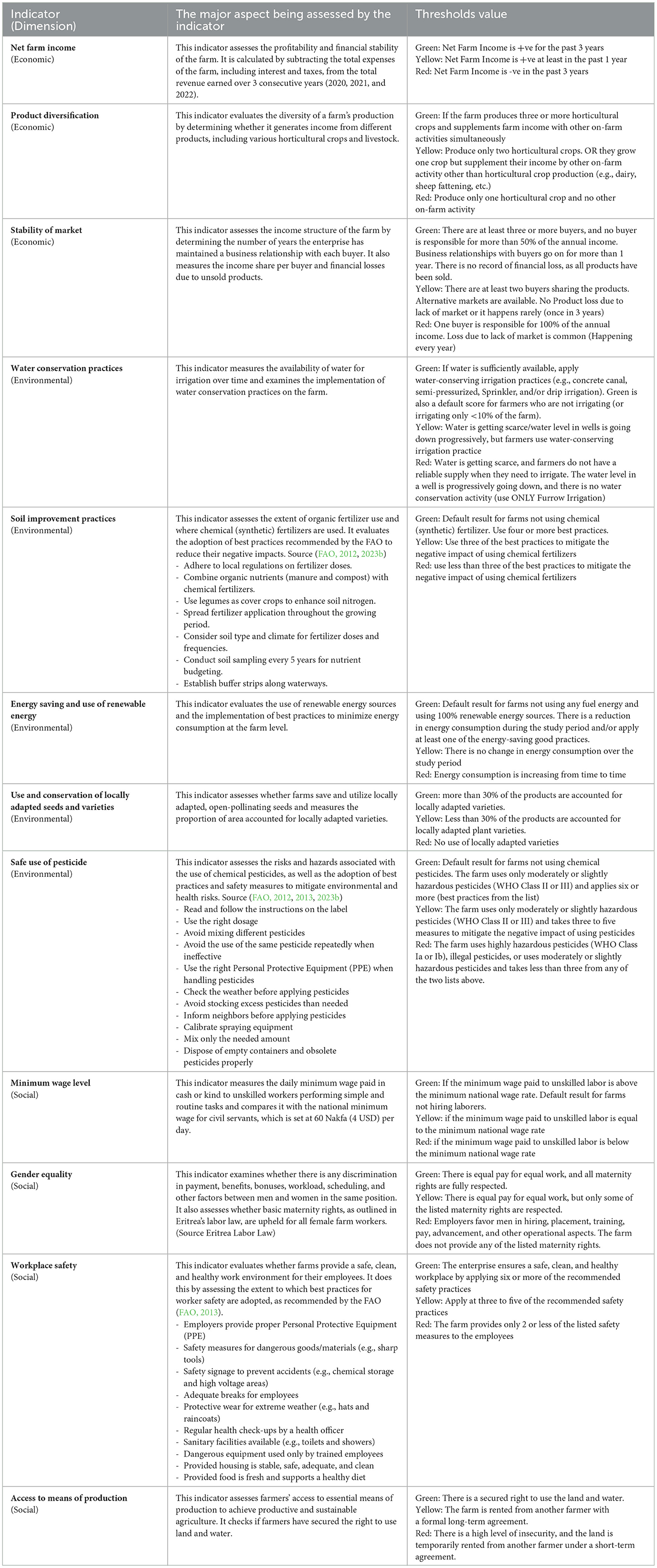
Table 2. Final List of Indicators and their threshold value (FAO, 2017; Haile et al., 2024).
To categorize the farms according to their sustainability, a “Traffic Light Approach” was adopted, with three sustainability levels for each indicator. Green for sustainable achievements, yellow for acceptable, and red for unsustainable results (FAO, 2017; Gennari and Navarro, 2019). The proportion of agricultural area under a given sustainability status was compared for the two sub-zobas by adding the area of the farm under each category. This approach allows interpretation and analysis by measuring performance in terms of different sustainability indicators and dimensions, enabling policymakers to understand areas of weakness and/or strength.
2.3 Sampling
The study's sampling frame comprised all registered horticultural farmers in the two sub-zobas, i.e., 140 in Dighe and 240 in Gala Nefhi. A stratified random sampling technique was employed, taking into account farm size, crop type, location, and the farmer's gender. Farmers owning less than one hectare were excluded from the study, as these smaller farms are primarily subsistence-based, making the application of most sustainability indicators impractical. Consequently, a total of 170 farmers (94 from Dighe and 76 from Gala Nefhi) were randomly selected for the assessment. Data collection occurred from March to June 2023, focusing on activities done from 2020 to 2022.
2.4 Data collection
All selected indicators were measured at the farm level. The primary data were collected through in-person interviews using a structured questionnaire on the three dimensions of sustainability using the 12 indicators. The owner or another knowledgeable person about the farm (e.g., a family member, manager, or co-owner) was questioned about the sustainability aspects of the farm. Data from the field were extracted to spreadsheets for subsequent calculation of indicators. Before commencing data collection, ethical clearance was secured from both the university and the relevant authorities in the host country.
To enhance the primary data's accuracy and to address gaps from the farm survey, secondary sources were utilized, including agricultural surveys, socioeconomic assessments, production and price statistics, and administrative data collected at both farm and sub-zoba levels.
2.5 Independent (explanatory) variables
Seven independent variables were used to predict changes in sustainability: farm size, land ownership, access to credit, access to extension service, horticultural crop farming experience, training participation, and membership in the horticultural crop producers' association (Table 3).
2.6 Data preparation
The value of each sustainability dimension (the dependent variable) is calculated as an average of scores of indicators under the specific sustainability dimension. For example, the total score for economic sustainability is derived as an average of the three economic indicators, i.e., product diversification, net farm income, and market stability, each rated on a color-coded scale [green (3), yellow (2), and red (1)]. Since all the indicators are measured on a similar scale, averaging the normalized score can create a continuous variable (e.g., Total Economic Sustainability Score) that captures the indicators' central tendency under the sustainability dimension, which is a separate dependent variable. This methodology allows for a comprehensive understanding of how these various factors independently and collectively impact different dimensions of agricultural sustainability. The approach involves statistical analysis to determine the strength and significance of the relationships between independent variables and sustainability scores in the dimensions.
2.7 Data analysis
Multiple Linear Regression (MLR) analysis was conducted in IBM SPSS (version 25) to examine the relationship between the independent variables and the economic, environmental, and social sustainability scores for the two sub-zobas. Accordingly, six separate models were run, one for each combination of sustainability score and sub-zoba.
The model employs MLR using this equation
where:
y= dependent variable
β0 = Constant (intercept)
βi = Regression coefficient for the i-th independent variable (xi)
xi = Independent variable i
ε = error term
Before running the MLR models, all necessary assumptions were carefully assessed and met. Multicollinearity was not an issue, as all tolerance values were above 0.10, VIF values were below 10, and condition indices for the predictor variables were below the critical threshold of 30, indicating that the independent variables were not highly correlated. The normality of residuals was examined using a P-P plot, which showed that the residuals closely followed the normal line, supporting the assumption of normality. Standardized predicted values and standardized residuals had means close to zero and standard deviations of ~1, further validating model assumptions. The assumption of homoscedasticity was checked using a scatterplot of residuals against predicted values, which displayed no discernible patterns and an even spread of residuals, confirming equal variance across predictions. The maximum Cook's distance for all models was <1, indicating that there were no influential outliers affecting the model. The Durbin-Watson test results confirmed no autocorrelation in the residuals, as the value was within the acceptable range of ~1.5 to 2.5. To validate the reliability and stability of the models, bootstrapping with 1,000 samples was performed.
The MLR models used the explanatory variables listed in Table 3, which were selected based on theoretical relevance and data quality. Certain demographic variables were excluded due to contextual and structural limitations. Gender was highly skewed (only 5 out of 170 respondents were female), making it unsuitable for statistical analysis. Age was replaced with farming experience, which served as a more consistent proxy, especially in cases of group or shared farm ownership where individual age and education were difficult to attribute. These exclusions were made to maintain the validity and interpretability of the models while still capturing the most relevant explanatory variables.
3 Results
3.1 Background information of respondents
The background information of the respondents shows a notable difference in gender representation, the legal status of farm ownership, and the roles of respondents within the two study areas (Table 4). These differences underscore varied agricultural dynamics, operation structure, and farm ownership arrangements.
Comparison of the independent variables between the two sub-zobas shows significant differences in farm size (p < 0.000), with Dighe having much larger farms, and in access to extension services (p = 0.047), where Dighe reports more frequent access. At the same time, there are slight differences; no statistically significant differences were found in farm experience, training frequency, land ownership, access to credit, and membership in producer associations (Table 5).
3.2 Sustainability assessments
Findings on the sustainability status of horticulture crop production in the two sub-zobas are shown in Figures 2, 3. The analysis reveals differences in the performance of sustainability indicators and areas of strength for each sub-zoba.
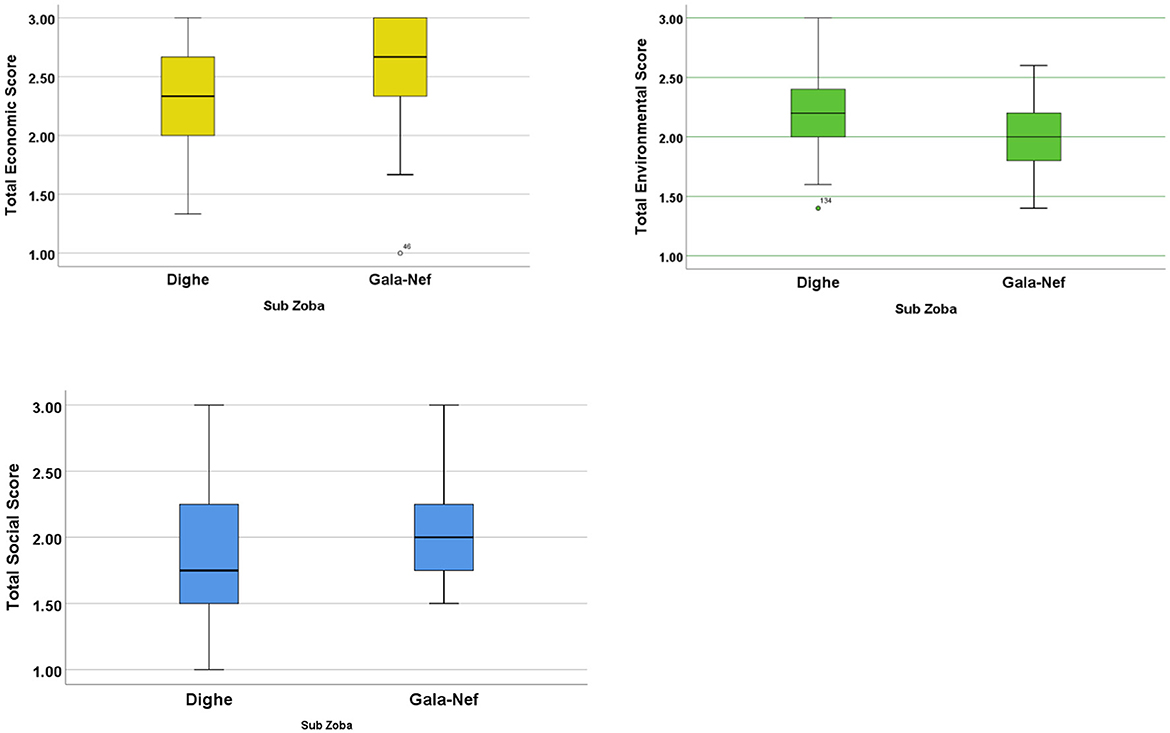
Figure 2. Comparative Boxplots of Total Economic, Environmental, and Social Sustainability Scores for Dighe and Gala Nefhi Sub-Zobas.
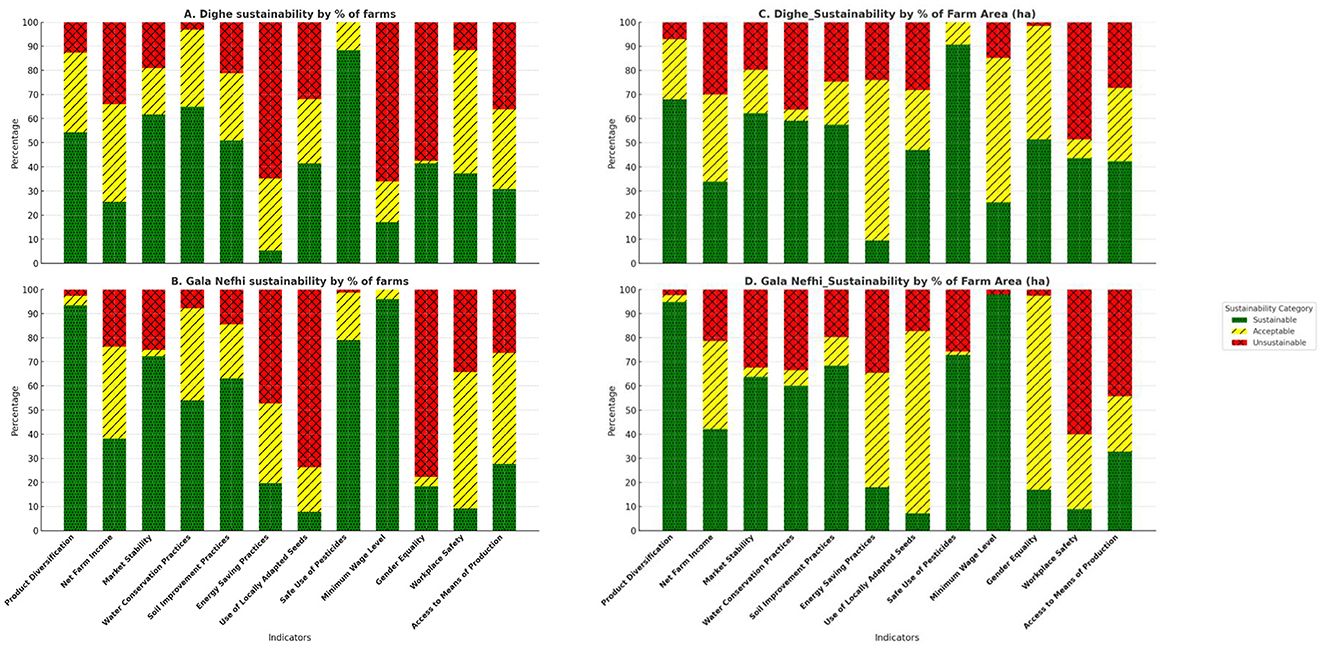
Figure 3. Comparison of sustainability levels in Dighe and Gala Nefhi based on the number of farms and farm areas in hectare. (A, B) Percentage of farms in Dighe and Gala Nefhi, respectively, categorized into sustainable, acceptable, and unsustainable based on the sustainability assessments using the 12 indicators. (C, D) Percentage of total farm area (ha) in Dighe and Gala Nefhi, respectively, categorized into sustainable, acceptable, and unsustainable practices using the 12 indicators, illustrating the area falling under the different sustainability categories.
4 Discussion
4.1 Agricultural sustainability performance
The comparative analysis of sustainability scores between the two sub-zobas shows notable differences across economic, environmental, and social dimensions (Figure 2). Economically, both sub-zobas show similar median scores, but Gala Nefhi exhibits greater variability, suggesting more uneven economic performance among its farms. Environmentally, Dighe outperforms Gala Nefhi with higher and more stable scores, indicating that farms in Dighe are adopting more sustainable environmental practices. Regarding social sustainability, the two sub-zobas show relatively similar results, though Dighe has a slightly higher median score, reflecting more consistent social outcomes. In contrast, Gala Nefhi has broader variability, indicating that some farms excel in social sustainability while others lag behind. The variations in sustainability performance underscore the influence of localized factors on agricultural practices (Hartmuth et al., 2008). Such differences stem from geographic, socioeconomic, climatic conditions, or infrastructural support variations that affect the feasibility and adoption of certain sustainability practices (Bell and Morse, 2008; Gasso-Tortajada, 2014).
Figure 3 shows the sustainability assessment based on the “number of farms” and “farm areas” falling under a given sustainability indicator. Each approach offers distinct insights valuable for comprehensive and integrated sustainability assessments and policy-making. The “number of farms” measure provides a better understanding of the prevalence of sustainable practices among individual farms, which is essential for assessing behavior, the effectiveness of extension programs, and community engagement in sustainability initiatives. Conversely, assessing sustainability from the 'farm area' perspective offers a clearer sense of the sustainability footprint concerning soil management, water conservation, and agrochemical use and also ensures an inclusive sustainability assessment by incorporating both smallholder farmers and large-scale farming operations. The results indicate significant differences in water conservation practices, energy-saving practices, minimum wage levels, gender equality, and workplace safety when measured using the “number of farms” and “farm size” perspectives.
The result in Gala Nefhi shows high proportions in the sustainable category, particularly in product diversification, water conservation practice, safe use of pesticides, and minimum wage level when considering both the number of farms and farm areas. Gala Nefhi, located near the capital city and a major market for horticultural products, leads to higher sustainability in indicators such as product diversification and market stability. The demand from the market also incentivizes farmers to adopt sustainable practices often preferred by urban consumers. The highland humid agroecological condition in this sub-zoba is conducive for a wide range of vegetables and fruits. This means that farmers can practice diversified crop rotation plans, including new exotic varieties, especially if they are high-yielding and tolerant to pests and diseases, which contributes to positive scores in product diversification. A similar study in Brazil illustrates that access to the market significantly impacts product diversification, highlighting that improved market access, particularly through better infrastructure such as roads, storage units, and distribution centers, enhances farmers' incentives to diversify their agricultural portfolios (Perosa et al., 2024).
In Gala Nefhi, the higher result in product diversification has resulted in lower sustainability scores in the use and conservation of locally adapted varieties, showing how farmers are less dependent on indigenous and locally adapted seeds. Studies on African Indigenous and locally adapted crops show that reliance on high-yielding exotic varieties has inherent agronomic, ecological, nutritional, and economic risks, which can lead to increased vulnerability to climate change, as well as pests and diseases, in the long run (Akinola et al., 2020).
Gender Equality is a major concern, particularly in Gala Nefhi, where 77.63% of farms fall into the unsustainable category. This means most of the farm owners favor men in hiring laborers and do not pay equally for men and women doing the same work. It also shows that most farm owners do respect the maternity rights of female workers, as outlined in Eritrea's labor law. Underlying factors contributing to this gender inequality may include cultural and religious norms, as well as limited awareness regarding gender issues. This aligns with research from Ethiopia, Tanzania, Uganda, Kenya, and Ecuador, which highlights similar challenges for women, such as disproportionate workloads, discrimination, and restricted access to labor rights in the horticulture sector (Brahic and Jacobs, 2013; Dolan and Sutherland, 2002; Nischalke et al., 2018; Raynolds, 2021). This underlines the necessity of implementing gender-sensitive measures to empower female workers, ensuring their rights and equal opportunities.
The most remarkable achievement in Dighe is in the safe use of pesticides, where 88.3% of the farms or 90.66% of the farmland are categorized as sustainable. This can be attributed to effective educational initiatives that train farmers in integrated pest management (IPM) and the responsible use of pesticides. Such training programs, combined with strong local or national regulations that mandate strict guidelines on pesticide use, can shape farmers' practice in the use of pesticides in a way that minimizes environmental impact while still effectively managing pests. This finding matches research done in other developing countries, where trained farmers showed higher levels of safety behavior and practices in the use of pesticides (Damalas and Koutroubas, 2017).
The “acceptable” range in various indicators across both sub-zobas represents a middle ground of performance, where practices do not fully meet sustainability standards but do not fall into the realm of unsustainability. Enhancing practices that fall in the acceptable range across both sub-zobas could provide significant benefits, pushing the agricultural sector closer to the ideal of comprehensive sustainability. For example, in Dighe, a significant area (66.49%) falls under the acceptable category for Energy Saving Practices, which suggests that while there is some level of energy conservation in place, there is also considerable room for enhancement. Similarly, in Gala Nefhi, a notable number of farms fall in the acceptable range in assessing the safety of farm workers. This indicates the existence of some achievement in securing the safety of farm workers, yet there is still a need for additional work to improve the result to the sustainable category. This suggests that both sub-zobas would benefit from a tailored approach to sustainability that addresses current shortcomings and builds on existing strengths.
Another significant achievement for Dighe is in the use and conservation of locally adapted seeds, where 88.3% of the sampled farms, or 90.66% of the area, fall under the sustainable category. The lower annual mean rainfall compounded with the dry weather could be the reason why farmers rely on local seed varieties that are adapted to the local conditions. This aligns with the findings of Padulosi et al. (2013), which highlight that farmers in regions with challenging agroclimatic conditions often opt for locally adapted seeds due to their resilience in withstanding poor soil fertility, drought, and other environmental stresses.
The efficiency of water conservation practices in semi-arid conditions depends on how farmers sustainably draw water from underground wells for irrigation purposes. With land being less scarce, average farm sizes are much larger in Dighe. This creates less pressure on land resources, leading to more sustainable land management practices. Sub-zoba Dighe, located ~200 km from the capital city, makes it difficult to provide fresh fruits and vegetables at a competitive price, resulting in lower market stability scores compared to Gala Nefhi.
In summary, Gala Nefhi's advantages in market access and agroclimatic conditions contribute to higher sustainability in certain indicators, while Dighe's larger farm sizes and adapted crop choices offer different sustainability benefits. This shows that each area's unique challenges need targeted sustainable agricultural strategies to ensure that both areas can optimize their agricultural practices sustainably. Similar studies done in Ethiopia support this idea by elaborating on the variations in adopting sustainable agricultural practices in different parts of the country (Mutyasira et al., 2018; Teklewold et al., 2013).
4.2 Determinants of sustainability
The regression analyses for economic sustainability in Gala Nefhi and Dighe show similarities and differences (Table 6). In both regions, farm experience and cooperative membership emerge as significant positive predictors of economic sustainability (p < 0.01), highlighting the value of experience and collaborative structures in economic viability. Other variables, such as land ownership, access to credit, and access to extension services, show varying degrees of influence in each region, pointing to distinct local dynamics and challenges in agricultural practices. Bizikova et al. (2020) underline the crucial role cooperatives and collaborative efforts play in enhancing sustainability in agriculture. This shows that farmers' organizations, including cooperatives, significantly contribute to improving small-scale producers' incomes. These organizations facilitate access to markets, credit, and essential information, fostering economic benefits. In line with this, Agustin et al. (2018) suggest that cooperation and shared objectives among farmers, businesses, and other stakeholders are essential for enhancing sustainability in agricultural practices.

Table 6. Summary of Multiple Linear Regression results for economic, environmental, and social sustainability scores in Gala Nefhi and Dighe.
Based on the regression models, access to extension service and frequency of training are significant contributors to environmental sustainability in both sub-zobas (p < 0.01). In support of this finding, Pretty (2007) highlights the role of extension services and training in enhancing environmental sustainability, as they are critical drivers toward more sustainable agricultural practice. Additional studies in East Africa also pinpoint extension and training as key factors in adopting sustainable agricultural practices (Belachew et al., 2020; Damalas and Koutroubas, 2017). Moreover, cooperative membership positively influences environmental sustainability in Dighe, underscoring the role of cooperative structures in environmental practices. This is also in line with other studies done in Ethiopia, where producers' associations play a vital role in the exchange of information and adoption of sustainable agricultural practices (Teklewold et al., 2013).
The social sustainability assessment in both sub-zobas shows unique patterns and different influencing variables specific to each area. In Gala Nefhi, the model identifies the frequency of training as the sole significant predictor. This indicates that the training given to farmers plays an important role in raising social awareness among the horticulture crop farmers. In contrast, the model for Dighe is more complex and has a stronger explanatory power. The positive impact of farm experience in Dighe suggests how veteran farmers develop a deeper understanding of workers' safety, gender equality, and other socially acceptable practices. Here, we also found cooperative memberships to be a crucial variable in enhancing the social fabric of the agricultural community. The difference in social sustainability outcomes shows the inherent complexity of the concept, which is difficult to attribute to specific, measurable variables (Murphy, 2012; Sulewski and Kłoczko-gajewska, 2018). Each region's unique social dynamics and sustainability challenges require tailored approaches to social sustainability initiatives.
5 Conclusion and recommendations
This study evaluated the sustainability of horticultural crop production in two regions of Eritrea, employing 12 tailored indicators to measure economic, environmental, and social sustainability. The findings underscore a complex relationship between various sustainability indicators and dimensions. This study also shows the strengths and areas for improvement for each sub-zobas, which demand context-specific sustainability strategies that cater to each area's distinct socioeconomic and agroecological settings. Therefore, a comprehensive approach to sustainability at a national level should consider cross-learning and knowledge-sharing between the two regions.
To enhance farm-level sustainability, it is essential to develop targeted policies and support systems tailored to the unique agricultural contexts. This includes integrating the sustainability indicators into extension services, planning processes, and farmers' training programs. Facilitating better market access and implementing diversified marketing strategies can also support sustainability in horticultural production systems. Continued research and monitoring to refine sustainability indicators and adapt to evolving agricultural landscapes are essential for sustained progress. Additionally, establishing multi-stakeholder platforms for dialog and coordination can enhance shared learning and improve the implementation of sustainability initiatives. Policymakers should also consider introducing incentive-based schemes for farms adopting sustainable practices. Strengthening local capacity in data collection and decision-support tools will be vital for monitoring progress and informing adaptive management. Future research should aim to validate these indicators over time, extend the analysis to other regions, and explore how policy and market dynamics influence sustainability outcomes.
Data availability statement
The raw data supporting the conclusions of this article will be made available by the authors, without undue reservation.
Author contributions
BH: Conceptualization, Data curation, Formal analysis, Investigation, Methodology, Software, Validation, Visualization, Writing – original draft, Writing – review & editing. AD: Methodology, Supervision, Validation, Writing – review & editing. AR: Methodology, Supervision, Validation, Writing – review & editing. TK: Methodology, Validation, Writing – review & editing.
Funding
The author(s) declare that financial support was received for the research and/or publication of this article. This research was funded by the Ministry of Agriculture, Eritrea, through the Integrated Agriculture Development Project (IADP), supported by the International Fund for Agricultural Development (IFAD), under Grant Number 2000002081. Further support was received from the Food Systems Research Network for Africa (FSNet-Africa). FSNet-Africa was funded by the Global Challenges Research Fund (GCRF) as a Research Excellence project under a partnership between UK Research and Innovation (UKRI) and the African Research Universities Alliance (ARUA). FSNet-Africa is a flagship project in the ARUA Centre of Excellence in Sustainable Food Systems (ARUA-SFS), which is hosted by the University of Pretoria (Grant ref. ES/T015128/1).
Conflict of interest
The authors declare that the research was conducted in the absence of any commercial or financial relationships that could be construed as a potential conflict of interest.
Generative AI statement
The author(s) declare that no Gen AI was used in the creation of this manuscript.
Publisher's note
All claims expressed in this article are solely those of the authors and do not necessarily represent those of their affiliated organizations, or those of the publisher, the editors and the reviewers. Any product that may be evaluated in this article, or claim that may be made by its manufacturer, is not guaranteed or endorsed by the publisher.
References
AfDB (2009). Central Highlands Irrigated Horticulture Development Project: Project Completion Report. Available online at: https://www.afdb.org/fileadmin/uploads/afdb/Documents/Evaluation-Reports-_Shared-With-OPEV_/EritreaCentralHidhlandsIrrigatedHorticultureDevelopmentProject~_EN.pdf (accessed February 15, 2024).
Agustin, W., Dania, P., Xing, K., and Amer, Y. (2018). Collaboration behavioural factors for sustainable agri-food supply chains: a systematic review. J. Clean. Prod. 186, 851–864. doi: 10.1016/j.jclepro.2018.03.148
Akinola, R., Pereira, L. M., Mabhaudhi, T., de Bruin, F. M., and Rusch, L. (2020). A review of indigenous food crops in Africa and the implications for more sustainable and healthy food systems. Sustainability 12, 1–30. doi: 10.3390/su12083493
Alotaibi, B. A., Yoder, E., Brennan, M. A., and Kassem, H. S. (2021). Perception of organic farmers towards organic agriculture and role of extension. Saudi J. Biol. Sci. 28, 2980–2986. doi: 10.1016/j.sjbs.2021.02.037
Angevin, F., Fortino, G., Bockstaller, C., Pelzer, E., and Messéan, A. (2017). Assessing the sustainability of crop production systems: toward a common framework? Crop Prot. 97, 18–27. doi: 10.1016/j.cropro.2016.11.018
Belachew, A., Mekuria, W., and Nachimuthu, K. (2020). Factors influencing adoption of soil and water conservation practices in the northwest Ethiopian highlands. Int. Soil Water Conserv. Res. 8, 80–89. doi: 10.1016/j.iswcr.2020.01.005
Bell, S., and Morse, S. (2001). Breaking through the glass ceiling: who really cares about sustainability indicators? Local Environ. 6, 291–309. doi: 10.1080/13549830120073284
Bell, S., and Morse, S. (2008). Sustainability Indicators: Measuring the Immeasurable? 2nd Edn. London: Earthscan.
Bertschinger, L. (2004). Making sustainability an issue in applied horticultural research making sustainability an issue in applied horticultural research. Acta Horticulturae 638, 17–24. doi: 10.17660/ActaHortic.2004.638.1
Bizikova, L., Nkonya, E., Minah, M., Hanisch, M., Mohana, R., Turaga, R., et al. (2020). A scoping review of the contributions of farmers'organizations to smallholder agriculture. Nat. Food 1, 620–630 doi: 10.1038/s43016-020-00164-x
Brahic, B., and Jacobs, S. (2013). Empowering Women: A Labor Rights-Based Approach: Case Studies from East African Horticultural Farms. Journal of Agricultural and Environmental Ethics 26, 601–619. doi: 10.1007/s10806-012-9424-9
Brundtland (1987). Report of the World Commission on Environment and Development: Our Common Future. United Nations General Assembly Document A/42/427.
Damalas, C. A., and Koutroubas, S. D. (2017). Farmers' training on pesticide use is associated with elevated safety behavior. Toxics 5:19. doi: 10.3390/toxics5030019
Dolan, C., and Sutherland, K. (2002). “Gender and employment in the Kenya horticulture value chain,” in Globalisation and Poverty Discussion Paper 8. https://citeseerx.ist.psu.edu/document?repid=rep1&type=pdf&doi=774c920fc0ba94395a2887eac4b477e3d2fca2a8 (accessed February 24, 2024).
Dumanski, J., Terry, E., Byerlee, D., and Pieri, C. (1998). Performance Indicators for Sustainable Agriculture. Washington, DC: The World Bank.
Etefa, O. F., Forsido, S. F., and Kebede, M. T. (2022). Postharvest loss, causes, and handling practices of fruits and vegetables in Ethiopia: scoping review. J. Horticult. Res. doi: 10.2478/johr-2022-0002
FAO (2013). SAFA indicators: Sustainability Assessment of Food and Agricultural System. Food and Agriculture Organization of the United Nations - Rome 2013, 271. https://openknowledge.fao.org/server/api/core/bitstreams/72070c29-47d6-47ef-8059-e78168c2fb69/content (accessed September 18, 2023).
FAO (2017). Percentage of agricultural area under productive and sustainable agriculture. Methodological concept note. SDG indicator 2.4.1. 1–31.
FAO (2023a). Proportion of Agricultural Area Under Productive and Sustainable Agriculture (SDG Indicator 2.4.1). Methodological Note (Revision 11). Available online at: http://www.fao.org/3/ca5157en/ca5157en.pdf (accessed June 12, 2025).
FAO (2023b). Guidelines on Analysis and Reporting (SDG Indicator 2.4.1). https://openknowledge.fao.org/server/api/core/bitstreams/8a9fb2b2-604c-4e1d-b1b9-37192e226bce/content (accessed January 25, 2024).
FAO (2024). The State of Food and Agriculture 2024 – Value-driven transformation of agrifood systems. FAO.
FAO IFAD, UNICEF, WFP and WHO. (2023). The State of Food Security and Nutrition in the World 2023. Urbanization, agrifood systems transformation and healthy diets across the rural–urban continuum.
Fernando, L., Pinto, G., Gardner, T., Mcdermott, C. L., Omar, K., and Ayub, L. (2014). Group certification supports an increase in the diversity of sustainable agriculture network – rainforest alliance certi fi ed coffee producers in Brazil. Ecol. Econ. 107, 59–64. doi: 10.1016/j.ecolecon.2014.08.006
Frater, P., and Franks, J. (2013). Measuring agricultural sustainability at the farm-level: a pragmatic approach. Int. J. Agric. Manag. 2:207. doi: 10.5836/ijam/2013-04-04
Gasso-Tortajada, V. (2014). Assessing Sustainability of Agricultural Systems: Balancing Context Specificity and Generality. Aarhus University. doi: 10.13052/rp-9788793237254
Gennari, P., and Navarro, D. K. (2019). The challenge of measuring agricultural sustainability in all its dimensions. J. Sustain. Res. 1, 1–15. doi: 10.20900/jsr20190013
Gómez-Limón, J. A., and Sanchez-Fernandez, G. (2010). Empirical evaluation of agricultural sustainability using composite indicators. Ecol. Econ. 69, 1062–1075. doi: 10.1016/j.ecolecon.2009.11.027
GoSE (2004). Eritrea Interim Poverty Reduction Strategy Paper (I-Prsp) (Issue April). http://www.tralac.org/files/2012/12/Interim-PRSP.pdf (accessed October 19, 2022).
Haile, B. T., Dougill, A. J., and Ramoelo, A. (2024). Participatory selection and ranking of farm-level sustainability indicators: Evidence from the horticulture production system of Eritrea. New Agenda: South African Journal of Social and Economic Policy, 94(SI).
Hartmuth, G., Huber, K., and Rink, D. (2008). Operationalization and contextualization of sustainability at the local level. Sustain. Dev. 16, 261–270. doi: 10.1002/sd.377
Janker, J., and Mann, S. (2020). Understanding the social dimension of sustainability in agriculture: a critical review of sustainability assessment tools. Environ. Dev. Sustain. 22, 1671–1691. doi: 10.1007/s10668-018-0282-0
Kasztelan, A., and Nowak, A. (2024). Green growth in agriculture—New measurement concept and its empirical verification. Sustain. Dev. 32, 325–335. doi: 10.1002/sd.2661
Lampridi, M. G., and Sørensen, C. G. (2019). Agricultural Sustainability: A Review of Concepts and Methods. Sustainability 11:5120. doi: 10.3390/su11185120
Lillywhite, R. (2014). “Horticulture and the Environment,” in Horticulture: Plants for People and Places, eds. G. Dixon and D. Aldous (Dordrecht: Springer) pp. 603–617. doi: 10.1007/978-94-017-8581-5_1
Luján Soto, R., Cuéllar Padilla, M., and de Vente, J. (2020). Participatory selection of soil quality indicators for monitoring the impacts of regenerative agriculture on ecosystem services. Ecosyst. Serv. 45:101157. doi: 10.1016/j.ecoser.2020.101157
Murphy, K. (2012). The social pillar of sustainable development : a literature review and framework for policy analysis. Sustain. Sci. Pract. Policy 7733, 15–29. doi: 10.1080/15487733.2012.11908081
Mutyasira, V., Hoag, D., Pendell, D., Manning, D. T., and Berhe, M. (2018). Assessing the relative sustainability of smallholder farming systems in Ethiopian highlands. Agric. Syst. 167, 83–91. doi: 10.1016/j.agsy.2018.08.006
Nischalke, S. M., Abebe, M., Assefa, B., Keding, G. B., Kriesemer, S. K., Randrianarison, N., et al. (2018). Gender challenges in horticultural research in Ethiopia and Madagascar. Acta Horticulturae 1205, 137–145. doi: 10.17660/ActaHortic.2018.1205.16
NSO (2013). Eritrea Population and Health Survey 2010. Available online at: https://www.afro.who.int/sites/default/files/2017-05/ephs2010_final_report_v4.pdf (accessed November 28, 2023).
Ogbazghi, W., and Stillhardt, B. (2011). Sustainable Land Management – A textbook with a focus on Eritrea. eds. T. Wachs and T. Kohler. Bern: Geographica Bernensia and Hamelmalo Agricultural College.
Padulosi, S., Thompson, J., and Rudebjer, P. (2013). Fighting poverty, hunger and malnutrition with neglected and underutilized species (NUS): needs, challenges and the way forward. Bioversity International, January 2013.
Perosa, B. B., Bicudo da Silva, R. F., and Batistella, M. (2024). Market access and agricultural diversification: an analysis of Brazilian Municipalities. Land 13, 1–13. doi: 10.3390/land13010061
Pretty, J. (2007). Agricultural sustainability: Concepts, principles and evidence. Philos. Trans. R. Soc. Lond. B. Biol. Sci. 363, 447–465. doi: 10.1098/rstb.2007.2163
Pretty, J., Thompson, J., and Hinchcliffe, F. (1996). Sustainable Agriculture: Impacts on Food Production and Food Security. Available online at: https://www.iied.org/6106iied (accessed September 6, 2023).
Raynolds, L. T. (2021). Gender equity, labor rights, and women's empowerment: lessons from Fairtrade certification in Ecuador flower plantations. Agric. Human Val. 38, 657–675. doi: 10.1007/s10460-020-10171-0
Reed, M. S., Dougill, A. J., and Baker, T. R. (2008). Participatory indicator development: What can ecologists and local communities learn from each other? Ecol. Appl. 18, 1253–1269. doi: 10.1890/07-0519.1
Reytar, K., Hanson, C., and Henninger, N. (2014). Indicators of sustainable agriculture: a scoping study. Creating a Sustainable Food Future, June 1–20.
Rigby, D., Woodhouse, P., Young, T., and Burton, M. (2001). Constructing a farm level indicator of sustainable agricultural practice. Ecol. Econ. 39, 463–478. doi: 10.1016/S0921-8009(01)00245-2
Robling, H., Abu Hatab, A., Säll, S., and Hansson, H. (2023). Measuring sustainability at farm level – A critical view on data and indicators. Environ. Sustain. Ind. 18:100258. doi: 10.1016/j.indic.2023.100258
Roy, R., Weng, N., and Ruslan, C. (2014). Rice farming sustainability assessment in Bangladesh. Sustain. Sci. 9, 31–44. doi: 10.1007/s11625-013-0234-4
Satisha, J. (2023). “Horticultural Crops,” in Trajectory of 75 years of Indian Agriculture after Independence, eds. P. K. Ghosh, A. Das, R. Saxena, K. Banerjee, G. Kar, and D. Vijay, Singapore: Springer. doi: 10.1007/978-981-19-7997-2_11
Silvestri, C., Silvestri, L., Piccarozzi, M., and Ruggieri, A. (2024). Toward a framework for selecting indicators of measuring sustainability and circular economy in the agri - food sector: a systematic literature review. Int. J. Life Cycle Assess. 29, 1446–1484. doi: 10.1007/s11367-022-02032-1
Sulewski, P., and Kłoczko-gajewska, A. (2018). Relations between agri-environmental, economic and social dimensions of farms. Sustainability 10:4629. doi: 10.3390/su10124629
Teklewold, H., Kassie, M., and Shiferaw, B. (2013). Adoption of multiple sustainable agricultural practices in Rural Ethiopia. J. Agric. Econ. 64, 597–623. doi: 10.1111/1477-9552.12011
Valizadeh, N., and Hayati, D. (2021). Development and validation of an index to measure agricultural sustainability. J. Clean. Prod. 280:123797. doi: 10.1016/j.jclepro.2020.123797
Van Calker, K. J., Berentsen, P. B. M., Giesen, G. W. J., and Huirne, R. B. M. (2005). Identifying and ranking attributes that determine sustainability in Dutch dairy farming. Agric. Human Val. 22, 53–63. doi: 10.1007/s10460-004-7230-3
Wainwright, H., Jordan, C., and Day, H. (2014). “Environmental impact of production horticulture,” in Horticulture: Plants for People and Places, eds. G. R. Dixon and D. E. Aldous, Singapore: Springer Vol. 1, p. 503–522. doi: 10.1007/978-94-017-8578-5_15
Yegbemey, R. N., Yabi, J. A., Dossa, C. S. G., and Bauer, S. (2014). Novel participatory indicators of sustainability reveal weaknesses of maize cropping in Benin. Agro. Sustain. Dev. 34, 909–920. doi: 10.1007/s13593-014-0214-9
Zarei, S., Bozorg-Haddad, O., Singh, V. P., and Loáiciga, H. A. (2021). Developing water, energy, and food sustainability performance indicators for agricultural systems. Sci. Rep. 11, 1–14. doi: 10.1038/s41598-021-02147-9
Keywords: agricultural sustainability, indicators, farm level, horticulture, Eritrea
Citation: Haile BT, Dougill AJ, Ramoelo A and Kidane TT (2025) Assessing farm-level sustainability: a comparative analysis of horticultural production systems in Eritrea. Front. Sustain. Food Syst. 9:1532356. doi: 10.3389/fsufs.2025.1532356
Received: 21 November 2024; Accepted: 03 June 2025;
Published: 02 July 2025.
Edited by:
Albie F. Miles, University of Hawaii–West Oahu, United StatesReviewed by:
Marcello Stanco, University of Sannio, ItalySuzanne Thornsbury, University of Florida, United States
Copyright © 2025 Haile, Dougill, Ramoelo and Kidane. This is an open-access article distributed under the terms of the Creative Commons Attribution License (CC BY). The use, distribution or reproduction in other forums is permitted, provided the original author(s) and the copyright owner(s) are credited and that the original publication in this journal is cited, in accordance with accepted academic practice. No use, distribution or reproduction is permitted which does not comply with these terms.
*Correspondence: Bereket T. Haile, YmVyZXRzZWhheWVAZ21haWwuY29t; dTIyOTA0NTA3QHR1a3MuY28uemE=
†Present Address: Abel Ramoelo, Earth Observation Programme, South African National Space Agency (SANSA), Pretoria, South Africa
 Bereket T. Haile
Bereket T. Haile Andrew J. Dougill
Andrew J. Dougill Abel Ramoelo
Abel Ramoelo Tesfai T. Kidane
Tesfai T. Kidane